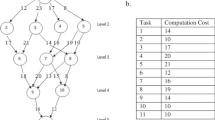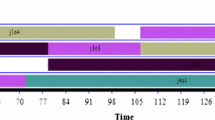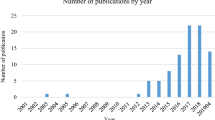Abstract
Generating schedules such that all operations are repeated every constant period of time is as important as generating schedules with minimum delays in all cases where a known discipline is desired or obligated by stakeholders. In this paper, a periodic job shop scheduling problem (PJSSP) based on the periodic event scheduling problem (PESP) is presented, which deviates from the cyclic scheduling. The PESP schedules a number of recurring events as such that each pair of event fulfills certain constraints during a given fixed time period. To solve such a hard PJSS problem, we propose a hybrid algorithm, namely PSO-SA, based on particle swarm optimization (PSO) and simulated annealing (SA) algorithms. To evaluate this proposed PSO-SA, we carry out some randomly constructed instances by which the related results are compared with the proposed SA and PSO algorithms as well as a branch-and-bound algorithm. In addition, we compare the results with a hybrid algorithm embedded with electromagnetic-like mechanism and SA. Moreover, three lower bounds (LBs) are studied, and the gap between the found LBs and the best found solutions are reported. The outcomes prove that the proposed hybrid algorithm is an efficient and effective tool to solve the PJSSP.
Similar content being viewed by others
References
Guo ZX, Wong WK, Leung SYS, Fan JT, Chan SF (2008) Genetic optimization of order scheduling with multiple uncertainties. Expert Syst Appl 35:1788–1801
Guo ZX, Wong WK, Leung SYS, Fan JT, Chan SF (2008) A genetic-algorithm-based optimization model for scheduling flexible assembly lines. Int J Adv Manuf Technol 36:156–168
Gao J, He G, Wang Y (2009) A new parallel genetic algorithm for solving multiobjective scheduling problems subjected to special process constraint. Int J Adv Manuf Technol 43:151–160
Zhang C, Rao Y, Li P (2008) An effective hybrid genetic algorithm for the job shop scheduling problem. Int J Adv Manuf Technol 39:965–974
Naderi B, Khalili M, Tavakkoli-Moghaddam R (2009) A hybrid artificial immune algorithm for a realistic variant of job shops to minimize the total completion time. Comput Ind Eng 56(4):1494–1501
Sha DY, Lin HH (2009) A multi-objective PSO for job-shop scheduling problems. Expert Syst Appl. doi:10.1016/j.eswa.2009.06.041
Xia WJ, Wu ZM (2006) A hybrid particle swarm optimization approach for the job-shop scheduling problem. Int J Adv Manuf Technol 29:360–366
Mehdizadeh E, Sadi-Nezhad S, Tavakkoli-Moghaddam R (2008) Optimization of fuzzy clustering criteria by a hybrid PSO and fuzzy c-means clustering algorithm. Iran J Fuzzy Syst 5(3):1–14
Eswaramurthy VP, Tamilarasi A (2009) Hybridizing tabu search with ant colony optimization for solving job shop scheduling problems. Int J Adv Manuf Technol 40:1004–1015
Wang YM, Xiao NF, Yin HL, Hu EL, Zhao CG, Jiang YR (2008) A two-stage genetic algorithm for large size job shop scheduling problems. Int J Adv Manuf Technol 39:813–820
Pan CH, Huang HC (2009) A hybrid genetic algorithm for no-wait job shop scheduling problems. Expert Syst Appl 36:5800–5806
Roshanaei V, Khaleghei A, Balagh G, Esfahani MMS, Vahdani B (2009) A mixed-integer linear programming model along with an electromagnetism-like algorithm for scheduling job shop production system with sequence-dependent set-up times. Int J Adv Manuf Technol. doi:10.1007/s00170-009-2210-9
Garey MR, Johnson DS, Sethi R (1976) The complexity of flowshop and job-shop scheduling. Math Oper Res 1:117–129
Serafini P, Ukovich W (1989) A mathematical model for periodic scheduling problems. SIAM J Discrete Math 2(4):550–581
Brucker P, Kampmeyer T (2005) Tabu search algorithms for cyclic machine scheduling problems. J Sched 8:303–322
Brucker P, Kampmeyer T (2008) A general model for cyclic machine scheduling problems. Discrete Appl Math 156:2561–2572
Chrétienne P (1991) The basic cyclic scheduling problem with deadlines. Discrete Appl Math 30:109–123
Munier A (1996) The basic cyclic scheduling problem with linear precedence constraints. Discrete Appl Math 64:219–238
Kimbrel T, Sviridenko M (2008) High-multiplicity cyclic job shop scheduling. Oper Res Lett 36:574–578
Cavory G, Dupas R, Goncalves G (2005) A genetic approach to solving the problem of cyclic job shop scheduling with linear constraints. Eur J Oper Res 161:73–85
Song JS, Lee TE (1998) Petri net modeling and scheduling for cyclic job shops with blocking. Comput Ind Eng 34(2):281–295
Tohme H, Nakamura M, Hachiman K, Onaga K (1999) Evolutionary Petri net approach to periodic job-shop scheduling. In: Proc IEEE Int Conf Syst Man Cybern (SMC’99) 12–15 October 1999, Tokyo, Japan, vol. 4:441–446
Song JS, Lee TE (1996) A tabu search procedure for periodic job shop scheduling. Comput Ind Eng 30(3):321–577
Lee TE, Posner ME (1997) Performance measures and schedules in periodic job shops. Oper Res 45(1):72–91
Liebchen C (2006) Periodic timetable optimization in public transport. PhD Thesis, Technische Universität Berlin
Kinder M (2008) Models for periodic timetabling. Master’s thesis, Technische Universität Berlin
Liebchen C, Peeters L (2002) Some practical aspects of periodic timetabling. In: Cha-moni P, Leisten R, Martin A, Minnemann J, Stadtler H (eds) Operations research proceeding 2001. Springer, Berlin
Odijk MA (1994) Construction of periodic timetables. Part I: a cutting plane algorithm. Technical Report, DUT-TWI-94-61, Delft, The Netherlands
Nachtigall K (1996) Cutting planes for a polyhedron associated with a periodic network. DLR Interner Bericht, 112-96/17
Chang PC, Chen SH, Fan CY (2009) A hybrid electromagnetism-like algorithm for single machine scheduling problem. Expert Syst Appl 36:1259–1267
Naderi B, Tavakkoli-Moghaddam R, Khalili M (2009) Electromagnetism-like mechanism and simulated annealing algorithms for flowshop scheduling problems minimizing the total weighted tardiness and makespan. Knowl-Based Syst. doi:10.1016/j.knosys.2009.06.002
Tavakkoli-Moghaddam R, Khalili M, Naderi B (2009) A hybridization of simulated annealing and electromagnetic-like mechanism for job shop problems with machine availability and sequence-dependent setup times to minimize total weighted tardiness. Soft Comput 13:995–1006
Lin TL, Horng SJ, Kao TW, Chen YH, Run RS, Chen RJ, Lai JL, Kuo IH (2009) An efficient job-shop scheduling algorithm based on particle swarm optimization. Expert Syst Appl. doi:10.1016/j.eswa.2009.08.015
Liu B, Wang L, Jin YH (2007) An effective hybrid particle swarm optimization for no-wait flow shop scheduling. Int J Adv Manuf Technol 31:1001–1011
Zhang G, Shao X, Li P, Gao L (2009) An effective hybrid particle swarm optimization algorithm for multi-objective flexible job-shop scheduling problem. Comput Ind Eng 56:1309–1318
Kennedy J, Eberhart RC (1995) Particle swarm optimization. In: Proc IEEE International Conference on Neural Networks, IEEE service Center, Piscataway, N.J., 4:1942–1948
Braune R, Zapfel G, Affenzeller M (2009) A computational study of lower bounding schemes for total weighted tardiness job shops. In: Proceedings of the 2nd International Symposium on Logistics and Industrial Informatics, LINDI 2009. pp 1–6
Hoitomt DJ, Luh PB, Pattipati KR (1993) A practical approach to job-shop scheduling problems. IEEE Trans Robot Automation 9(1):1–13
Lancia G, Rinaldi F, Serafini P (2007) A compact optimization approach for job-shop problems. In: Baptiste P, Kendall G, Munier-Kordon A, Sourd F (eds) Proceedings of the 3rd Multidisciplinary International Conference on Scheduling: theory and applications (MISTA), pp 293–300
Singer M, Pinedo M (1998) A computational study of branch and bound techniques for minimizing the total weighted tardiness in job shops. IIE Trans 30(2):109–118
Jamili A, Shafia MA, Tavakkoli-Moghaddam R (2009) A hybridization of simulated annealing and electromagnetism-like mechanism for a periodic job shop scheduling problem. Working paper
Author information
Authors and Affiliations
Corresponding author
Rights and permissions
About this article
Cite this article
Jamili, A., Shafia, M.A. & Tavakkoli-Moghaddam, R. A hybrid algorithm based on particle swarm optimization and simulated annealing for a periodic job shop scheduling problem. Int J Adv Manuf Technol 54, 309–322 (2011). https://doi.org/10.1007/s00170-010-2932-8
Received:
Accepted:
Published:
Issue Date:
DOI: https://doi.org/10.1007/s00170-010-2932-8




